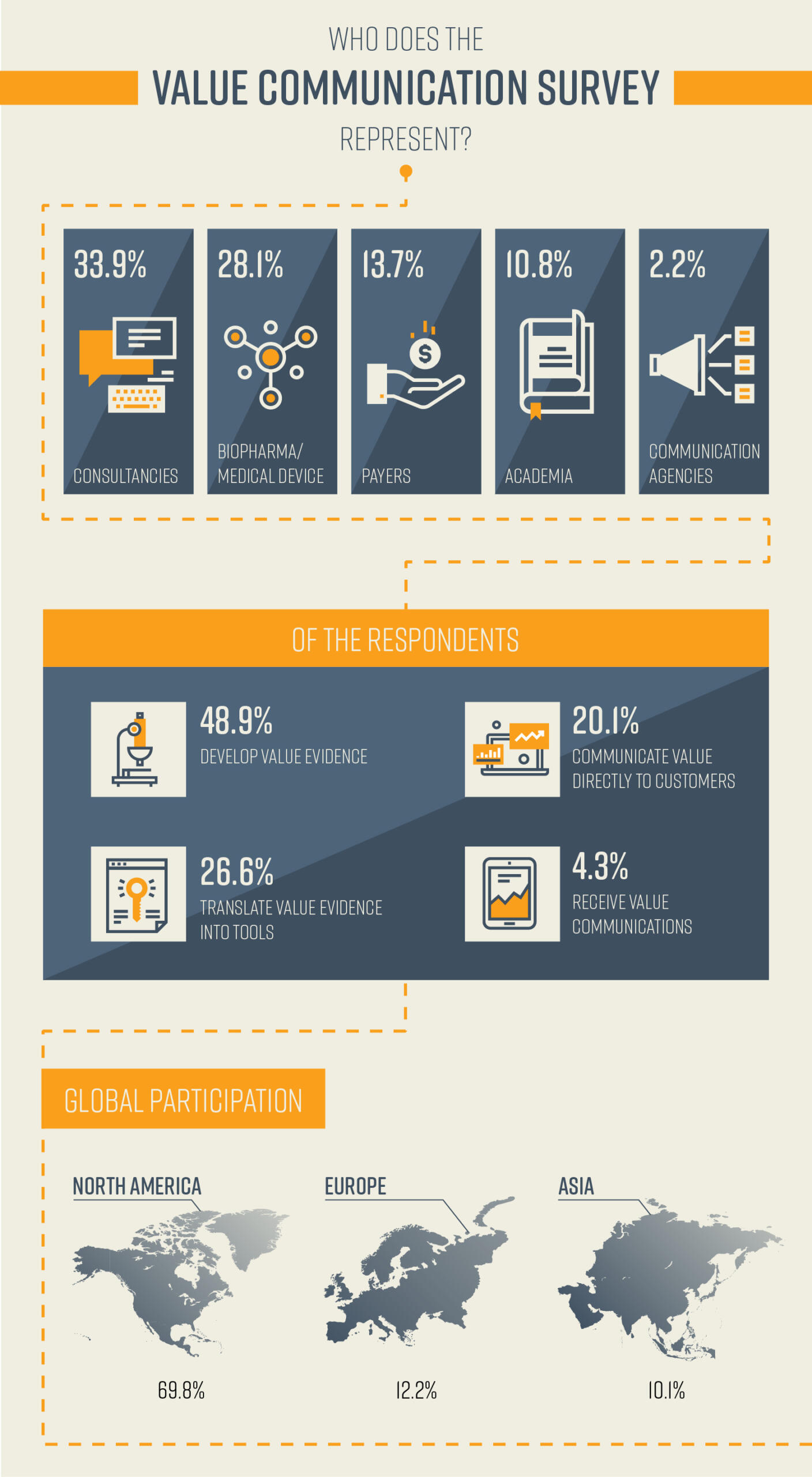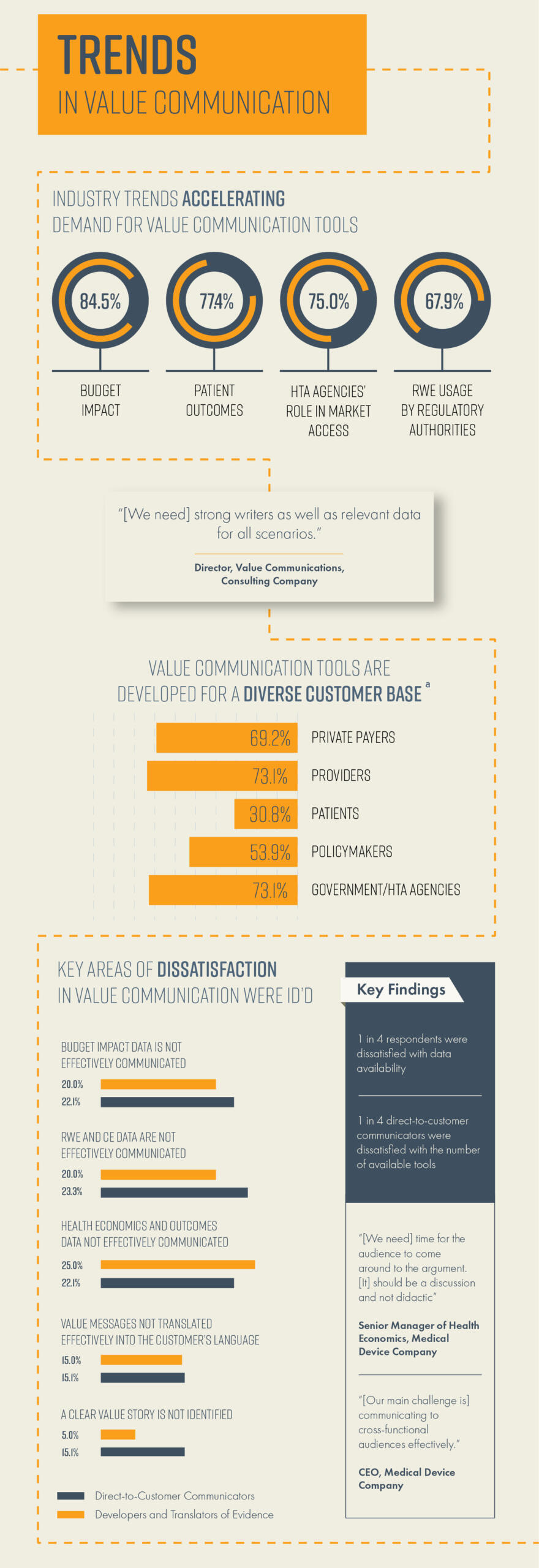Value Communication is Not Fit for Purpose in Biopharma
February 12, 2019

Value communication (VC) is essential for a successful market access strategy that aims to bring interventions to patients. It is no longer enough to simply show that an intervention is effective. VC must also focus on health economics and outcomes research (HEOR), market access, regulatory decision making, epidemiology and real-world evidence (RWE) while aligning with the interests of the stakeholder.
In a recent blog for Pharma Intelligence, Don Creighton, head of US Market Access for ICON and now Managing Director, Life Sciences Practice with Huron, bemoaned the state of VC, saying, “…companies fall short in communicating their value message consistently to all comers.”1 “All comers” refers not only to payers but also to patients, providers, advocacy groups, government bodies and society as a whole.
At the heart of communicating value messages are the people doing it. It is key to attract and retain top talent who understand the science of value demonstration, while using training to promote technical and soft skill sets that support the effective communication of VC to different audiences. Little research has been done in either the HEOR or the medical communications industry to investigate the drivers and barriers in VC as well as training needs. HealthEconomics.Com’s Value Communications survey (contribute your opinion here) identified barriers and gaps in VC that may render this industry function currently not fit for purpose.
Dr. Patti Peeples, CEO of HealthEconomics.Com, commented on this deficiency, saying: “The value communications process in our industry is not fit for purpose, because we do not have sufficient understanding of the needs, techniques, or effectiveness of these VC tools. It’s imperative that we investigate this from the perspective of the developers, the communicators, and the recipients of value evidence, and build in learning systems to measure how well we are achieving our VC objectives”.
A survey to identify key challenges and opportunities in value communication
To better understand the challenges and opportunities in communicating value, HealthEconomics.Com conducted an online survey of 139 individuals involved in developing, communicating or assessing the clinical, economic and humanistic value of pharmaceuticals and medical devices.
The Value Communication Survey represented a wide variety of companies, countries, and job functions as they relate to evidence development and communication.

Outsourcing was lower than expected among respondents
Surprisingly, 38.4% of all respondents did not outsource any of their work in VC, which is lower than average compared with HEOR research outsourcing. It is possible that this survey’s outsourcing rate is low because of factors like high outsourcing costs for tool development, increased in-house ability, or lack of outsourcing availability. This could be an area for further research.

The increasing need for VC tools mirrors the recently enacted 21st Century Cures Act on the use of RWE and patient experience data (PED) and the FDA RWE Framework released in December 2018.3,4 There is an increasing need for individualized VC tools for a diverse group of stakeholders, ranging from providers to private/public payers to patients.
More than 80% of respondents were interested in additional training in VC tool development and usage.
Among respondents, training was most needed in three main areas: writing skills, technical data and customer centricity.

Interestingly, a number of respondents identified social media and direct email marketing as commonly-used methods of value communication. This was confirmed by a 2016 Deloitte Review highlighting how companies are providing patients with digital engagement services.5 This goes beyond patients with a Capgemini Consulting survey of 866 providers finding that nearly half preferred digital communication including email and web portals.6 It will be key for any training to address this emerging area.
What is the perspective of value communication recipients?
Comments from individuals on the receiving end of value communication (e.g., payers, advocacy groups) focused on technical content, asking for improvement in health outcomes, trial result extrapolation and RWE. A Human Research Ethics Committee member from an association asked for “[clearer] health outcomes [to be] presented” while a manager of economics at an HTA agency wanted, “extrapolation beyond trial results [including] indications, setting, country, [and] length of follow up.”
It will be key for value communication personnel to be well-trained on the technical side of clinical and HEOR/RWE methodologies, in addition to the soft skills needed to deliver this information.
Respondents found tools like models and analyses most effective in value communication. Several also mentioned their preference for the web and webpage links.
What’s Next?
To conclude, evidence-based data is powerful in giving us ways to address the barriers in value communication identified by this survey, especially through training designed specifically to upskill value developers and communicators on the technical and soft skills of value communication.
As pharmaceuticals move away from volume to more value-based strategies, it is also developing into a digital environment with multichannel communication strategies. Value communication has to keep up. Developing the technical, writing and customer-centric knowledge of employees will provide a high return on investment, ensuring that patients have access to the products they need.
Further research remains to be done on value communication, including better defining product lifecycle-specific value communication tools and identifying the type of evaluation metrics that would be useful in measuring value communication effectiveness and ROI.
Dr. Peeples will be speaking more on this topic at two upcoming conferences:
Keynote Speaker, “The Value of a Drug – What it Means, Why it Matters, and How to Communicate it,” at 9 a.m. Wednesday, Feb. 20, at the 18th Annual International Publication Planning Meeting.
Workshop Leader, “ Building your Clinical Value Story/Value Dossier”,
at 9:25 a.m. and 10:15 a.m., April 17, 2019 at 15th Annual International Society of Medical Publications Professionals (ISMPP) .
If you are involved in evidence development, translation, or communication, and have any feedback about this topic or would like Dr. Peeples to speak to your group, please reach out to info@blogsite.healtheconomics.com.
[1] Looney, W. Repositioning Market Access: A Function Fit For Purpose In A New Era Of Costly Cures. Pharma Intelligence (2018). Available at: https://pharmaintelligence.informa.com/resources/product-content/repositioning-market-access-a-function-fit-for-purpose-in-a-new-era-of-costly-cures. [2] ISR Reports. Benchmarking the Pharma Industry’s HEOR Function. (2017). Available at: https://www.isrreports.com/wp-content/uploads/woocommerce_uploads/2017/09/2017-Benchmarking-the-Pharma-Industrys-HEOR-Function-2nd-Edition-Enterprise.pdf. [3] 114th Congress. 21st Century Cures Act, Public Law No: 114-255. (2015). [4] FDA. Framework for FDA’s Real-World Evidence Program. (2018). Available at: https://www.fda.gov/downloads/ScienceResearch/SpecialTopics/RealWorldEvidence/UCM627769.pdf. [5] Lush, M., Rosner, D., Zant, C. & Notte, S. Patient engagement strategies in a digital environment: Life sciences companies respond to changing patient expectations. Deloitte Review Issue 18 (2016). Available at: https://www2.deloitte.com/insights/us/en/deloitte-review/issue-18/patient-engagement-strategies-changing-patient-expectations.html. [6] Rose, W., Hasan, S., Saitta, J. A. & Kim, C. Tracking the Shift From Volume to Value in Healthcare. Capgemini Consulting (2017). Available at: http://www.volumetovaluestudy.com/docs/Tracking the Shift From Volume to Value in Healthcare.pdf.





